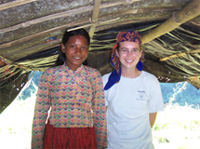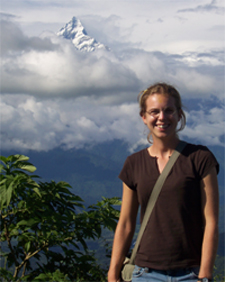 My stay in Nepal was an amazing experience, and I wish to thank SADP Nepal for making this possible. An especially nice part was that the Director, Mr. Ramesh Nath Sharma, worked hard to integrate experiences of Nepali culture into the general organic farm visit.
My stay in Nepal was an amazing experience, and I wish to thank SADP Nepal for making this possible. An especially nice part was that the Director, Mr. Ramesh Nath Sharma, worked hard to integrate experiences of Nepali culture into the general organic farm visit.
My trip started with a stay in the home of Mr. Sharma, as little work was happening on the farm as most of the laborers were celebrating the Teej festival. I was able to celebrate this festival along with Mr. Sharma’s family, and thought it a wonderful introduction to the Nepalese focus on the family as the center of society, and the wonderful Nepalesse music. After a quick tour of Pokhara (I highly recommend the Mountain Museum), Mr. Sharma brought me to the farm, where I would spend the bulk of my visit.
The Setti Valley Integrated Organic Farm (SIOF) is both a working organic farm, and a demonstration and experimentation station for SADP Nepal. It also happens to be located in a setting strongly reminiscent of early Renaissance paintings of the Garden of Eden, with a few stunning mountains and foothills of the Annapurna range thrown in!

I was most impressed with the spirit of experimentation that pervades the farm, as the owners, Mr. Sharma and Mr. Puspa Raj Paudel, work to find a truly sustainable way to build a farm. Every time I walked the fields with Mr. Sharma, he was able to tell me of both future plans for that square foot of land and previous experiments.
I was perhaps most enamoured of the vermi-compost operation, where the manure collected from the cows and buffalo is turned into the essential fertilizer for the vegetable operation. Though the worms might get all the attention, the careful labor that goes into this aspect of the farm, as goes into all aspects of the operation, is a wonderful example of thoughtfully executed organic farming. I will leave Mr. Sharma to explain his exact technique to the interested citizens of Nepal. The results of this careful care are clearly obvious in the fields, where two plots of cucumber, one with and one without an initial boost of compost worked into the soil, exhibit dramatically different growth and fruit production.
As a volunteer, I was able to ask questions and participate fully in any aspect of the operation that interested me. Unfortunately, my labor was very small compared with the hired local women, but I truly appreciate the opportunity to learn about a few of the different organic techniques in use at SIOF). Working with the local village women was also an eye opening experience of the challenges lower caste people, and especially women, face in Nepal. I hope that Mr. Sharma’s plans to link organic agriculture to community development are able to succeed.

I was able to stay right on the farm, in the temporary home of Puspa and Deepa Paudel. The views on clear mornings of Machhapuchre were worth rising early for, and I cannot imagine a lovelier setting for working in the fields. My hosts were very conscientious about giving me a private space for my things and to sleep, and the house was comfortably dry and surprisingly warm even during the late monsoon. The best part, of course, was Deepa Paudel’s wonderful dal bhat, spiced additionally by the knowledge the majority of the food we ate came directly from the farm. I purchased a book on Nepalese cooking before I left in hopes of re-creating some of those wonderful meals.
After leaving the SIOF, I had the opportunity to travel with Mr. Sharma to a meeting in another district to discuss the start of organic agriculture and possible agri-tourism ventures in the village of Cami (sp?). Even in a day that produced more rain than I have ever seen at one time, over 50 farmers hiked to the meeting, to hear Mr. Sharma speak about organic agriculture, and ask enthusiastic questions about the possibilities. This was perhaps one of the most inspiring parts of my visit, as I witnessed local farmers interested in switching to organic practices, and knew that there were leaders like Mr. Sharma to help them in this transition.
After a brief tour of Kathmandu, guided by Mr. Sharma, I ended my three weeks in Nepal, with the promise that I would return as soon as I am able. I was very impressed with the work that Mr. Sharma, SADP Nepal, and all of the farmers and organizers that I met were doing in Nepal. Even with the pressures of a small farming in an oftentimes difficult environment, Nepal is beginning to recognize the necessity of organic agriculture. I wish everyone at SADP all the best as they demonstrate organic agriculture on their many farms, and hope I have the chance to see the fruition of their many projects when I return.
Miriam Bowling
September 2007
